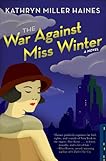 I have waxed poetic more than once about Jacqueline Winspear. She is one of my favorite mystery authors. No, she is one of my favorite authors, genre notwithstanding. Winspear does incredible research when writing her books to create one of the most accurate and realistic settings for a novel that I have read. As an author of historical fiction she has a better ability to create 1930s England than any author who was not writing during the 1930s.
I have waxed poetic more than once about Jacqueline Winspear. She is one of my favorite mystery authors. No, she is one of my favorite authors, genre notwithstanding. Winspear does incredible research when writing her books to create one of the most accurate and realistic settings for a novel that I have read. As an author of historical fiction she has a better ability to create 1930s England than any author who was not writing during the 1930s.The plot in this novel was easier to deduce than some of the other Maisie Dobbs stories. Nonetheless, the plot was no less fascinating for the easier deduction of the plot. In this story Maisie is researching a small town's brickworks that a client hopes to purchase. There is something off about the town which leads Maisie into a search of the towns past. Like her other stories the mystery resides in World War I. As with her other stories Winspear has an ability to get to the heart of the War and the difficulties it created for the European population. (I will openly admit, I have used situations in Winspear's books to create a plausible and identifiable setting in my history classes before. That's how genuine her research is.)
This is one of the first books in which Winspear sets up the coming world - although book four I believe also alluded to growing concerns on the Continent. While her stories continue to focus on World War I, she is beginning to allude to the growing problems in Germany. I am curious to see if in future books Winspear begins to incorporate fascism and Nazism into the stories. I would love to read her perceptions of right-wing politics in 1930s England. I have no doubt she will create an undeniably accurate and realistic world.
There is one more Jacqueline Winspear Maisie Dobbs book on my shelf waiting for me to read - Among the Mad. There is another to-be-published in 2010, The Mapping of Love and Death. I try not to read them too quickly as they are like candy - best savored over time.



